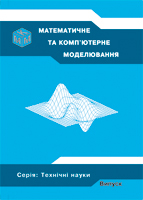Про деякі підходи до персоналізації щодо організації інтерфейсу користувача в автоматизованих системах
DOI:
https://doi.org/10.32626/2308-5916.2014-10.192-201Ключові слова:
automated system, information presentation, information storage form, dialog modeling, personalized UI, means of UI persona-lization.Анотація
In modern automated systems, users are often facing the problem of information overload due to the ever increasing amounts of information to be processed in a short time. Working in these conditions affects the quality of users performing their functions in the system and the reliability of the systems themselves.
In the article different existing approaches to solving this problem are described and analyzed, which are based on the idea of creating customized tools for users work with information. On the basis of these solutions a complex methodology of information representation and storage forms personalization is suggested, as well as software architecture based on it.
Посилання
Wickens C. D. Imperfect and Unreliable Automation and Its Implications For Attention Allocation, Information Access and Situation Awareness / C. D. Wickens // Technical Report ARL-00-10/NASA-00-2, Aviation Research Lab Institute of Aviation in University of Illinois. — 2000. — 28 p.
Радванська Л. М. Моделі, методи та засоби підвищення ефективності інтерфейсу «користувач — ЕОМ» у системах організаційного управлі¬ння : автореф. дис. ... канд. техн. наук / Л. М. Радванська. — Херсон : ХГТУ, 1999. — 17 с.
Ходаков Д. В. Моделі, методи та засоби адаптивності користувальниць-кого інтерфейсу : автореф. дис. ... канд. техн. наук / Д. В. Ходаков. – Херсон : ХГТУ, 2003. — 19 с.
Ковальчук А. М. Розробка адаптивного інтерфейсу користувача для про-грамного забезпечення наближення експериментальних даних : автореф. дис. ... канд. техн. наук / А. М. Ковальчук. — К. : ИПМЭ им. Г. Е. Пухова НАНУ, 2002. – 22 с.
Крылов А. О. Модели адаптивных пользовательских интерфейсов систем автоматизации проектирования в строительстве : автореф. дисс. ... канд. техн. наук / А. О. Крылов. — М. : ФГБОУ ВПО «МГСУ», 2011. — 16 с.
Customizable User Interface — Hitachi ID Identity Manager – Internet sourcet: http://hitachi-id.com/identity-manager/technology/ui-customization.html
VUE – Customizable User Interface – Internet source: http://www.evertz.com/-products/VUE.
Culturally Adaptive User Interfaces / Katharina Reinecke. A dissertation sub-mitted to the Faculty of Economics, Business Administration and Information Technologyof the University of Zurich, 2010. — 260 p.
Adaptive user interface of product recommendation based on eye-tracking / Shiwei Cheng, Xiaojian Liu, Pengyi Yan, Jianbo Zhou, Shouqian Sun // Pro-ceedings of the 2010 workshop on Eye gaze in intelligent human machine inte-raction. — P. 94–101.
Верлань А. Ф. Особенности оперативного тестирования на рабочем месте операторов систем поддержки принятия решений (СППР) / А. Ф. Верлань, М. Ф. Сопель, Ю. О. Фуртат // Математичне та комп’ютерне моделювання. Серія: Технічні науки : збірник наукових праць. — Кам’янець-Подільський : Кам’янець-Подільський національний університет імені Івана Огієнка, 2010. — Вип. 3. — C. 37–45.
Верлань А. Ф. Интеллектуальный тьютор в системах обучения / А. Ф. Вер-лань, И. А. Чмырь, Д. Велев // Международная научная конференция «Приложение на информационните и комуникационни технологии в икономиката и образованието», 2-3 декабря 2011 г. — София, 2011. — С. 317–326.
An Adaptive User Interface Based On Personalized Learning / Jiming Liu, Chi Kuen Wong, Ka Keung Hui // IEEE Intelligent Systems. — 2003. — Vol. 18, Issue 2. — P. 52–57.
A Conceptual Architecture for Adaptive Human-Computer Interface of a PT Operation Platform Based on Context-Awareness / Qing Xue, Xuan Han,
Mingrui Li, Minxia Liu. – Beijing Institute of Technology, School of Mechanical Engineering, Beijing, China. – 3 April 2014.
Когнитивные основы и особенности моделирования диалогового процесса / А. Ф. Верлань, И. А. Чмырь, Д. Велев, Ю. О. Фуртат // IV Международная конференция «Моделирование-2012», 16–18 мая 2012 г. — К. : ИПМЭ им. Г. Е. Пухова НАН Украины, 2012. — С. 442–445.
Верлань А. Ф. Діалогове моделювання як метод розв’язування задач об-робки знань у навчальних системах / А. Ф. Верлань, І. О. Чмир, Ю. О. Фуртат // Педагогічна і психологічна науки в Україні : зб. наук. праць : в 5 т. — К. : Педагогічна думка, 2012. — Т. 3: Загальна середня освіта. — С. 334–343.
Implementing Adaptive User Interface for Web Applications / Tadeusz Morzy, Marek Wojciechowski, Maciej Zakrzewicz, Piotr Dachtera, Piotr Jurga. – Poz-nan University of Technology, Poznan, Poland.
A Customizable User Interface. — Internet source: http://wiki.fluidproject.org/-display/fluid/A+Customizable+User+Interface
Известия ЮФУ. Технические науки. — Таганрог : Технологический инсти-тут Южного федерального университета, 2014. — № 1 (150). — С. 100–110.
Фуртат Ю. О. О влиянии адаптивных пользовательских интерфейсов на надежность и эффективность функционирования автоматизированных систем / Ю. О. Фуртат // Научно-технический вестник информационных технологий, механики и оптики. — 2014. — № 1 (89). — С. 71–75.
##submission.downloads##
Опубліковано
Номер
Розділ
Ліцензія
Authors who publish with this journal agree to the following terms:- Authors retain copyright and grant the journal right of first publication with the work simultaneously licensed under a Creative Commons Attribution License that allows others to share the work with an acknowledgement of the work's authorship and initial publication in this journal.
- Authors are able to enter into separate, additional contractual arrangements for the non-exclusive distribution of the journal's published version of the work (e.g., post it to an institutional repository or publish it in a book), with an acknowledgement of its initial publication in this journal.
- Authors are permitted and encouraged to post their work online (e.g., in institutional repositories or on their website) prior to and during the submission process, as it can lead to productive exchanges, as well as earlier and greater citation of published work (See The Effect of Open Access).

